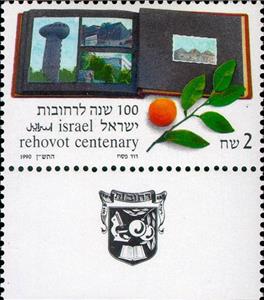Stamp with Collectible Margin: Centenary of Rehovot Settlement (Israel 1990)
Centenary of Rehovot Settlement (Israel 1990)
13 February (Israel ) within release Centenary of Rehovot Settlement goes into circulation Stamp with Collectible Margin Centenary of Rehovot Settlement face value 2 Israeli new shekel
| Stamp with Collectible Margin Centenary of Rehovot Settlement in catalogues | |
|---|---|
| Michel: | Mi: IL 1150T |
| Stamp Number: | Sn: IL 1040T |
| Yvert et Tellier: | Yt: IL 1094T |
| Stanley Gibbons: | Sg: IL 1094T |
Stamp with Collectible Margin is square format.
Photograph album and orange.Stamp with Collectible Margin Centenary of Rehovot Settlement it reflects the thematic directions:
An anniversary is the date on which an event took place or an institution was founded in a previous year, and may also refer to the commemoration or celebration of that event. For example, the first event is the initial occurrence or, if planned, the inaugural of the event. One year later would be the first anniversary of that event. The word was first used for Catholic feasts to commemorate saints. Most countries celebrate national anniversaries, typically called national days. These could be the date of independence of the nation or the adoption of a new constitution or form of government. The important dates in a sitting monarch's reign may also be commemorated, an event often referred to as a "Jubilee".
A book is a medium for recording information in the form of writing or images. Books are typically composed of many pages, bound together and protected by a cover. Modern bound books were preceded by many other written mediums, such as the codex and the scroll. The book publishing process is the series of steps involved in their creation and dissemination.
In botany, a fruit is the seed-bearing structure in flowering plants (also known as angiosperms) formed from the ovary after flowering. Fruits are the means by which angiosperms disseminate seeds. Edible fruits, in particular, have propagated with the movements of humans and animals in a symbiotic relationship as a means for seed dispersal and nutrition; in fact, humans and many animals have become dependent on fruits as a source of food. Accordingly, fruits account for a substantial fraction of the world's agricultural output, and some (such as the apple and the pomegranate) have acquired extensive cultural and symbolic meanings. In common language usage, "fruit" normally means the fleshy seed-associated structures of a plant that are sweet or sour, and edible in the raw state, such as apples, bananas, grapes, lemons, oranges, and strawberries. On the other hand, in botanical usage, "fruit" includes many structures that are not commonly called "fruits", such as bean pods, corn kernels, tomatoes, and wheat grains. The section of a fungus that produces spores is also called a fruiting body.
A photographer (the Greek φῶς (phos), meaning "light", and γραφή (graphê), meaning "drawing, writing", together meaning "drawing with light") is a person who uses a camera to make photographs.




